Italian actress Claudia Cardinale (1938) is one of Europe's iconic and most versatile film stars. The success of her films 8½ (1963) and Il Gattopardo/The Leopard (1963) piqued Hollywood's interest in her. But she returned to Italy to make the ultimate Spaghetti Western and is still appearing in many interesting European films. This is part 2 of EFSP's post on her.
Image may be NSFW.
Clik here to view.
Spanish postcard by Toro de Bronce, no. 160, dep. legal B. 20.666-1964. Photo: Sam Lévin.
Image may be NSFW.
Clik here to view.
French postcard by E.D.U.G., no. 183. Photo: Sam Lévin.
Image may be NSFW.
Clik here to view.
French postcard by E.D.U.G., no. 230. Photo: Sam Lévin.
Image may be NSFW.
Clik here to view.
Big French card. Photo: Sam Lévin.
Image may be NSFW.
Clik here to view.
French postcard by Edition P.I., Paris, no. 1102. Photo: Kasparian. Publicity still for Cartouche (1962).
In 1963 Claudia Cardinale played the princess who owned the Pink Panther diamond in The Pink Panther (Blake Edwards, 1963) which was filmed in Italy. It was the first in the series of detective comedies starring Peter Sellers as bumbling French Inspector Jacques Clouseau (the mishap-prone snoop was actually a supporting player in his debut).
The film was an enormous success and brought CC to English-speaking audiences. In 1964 she co-starred with John Wayne and Rita Hayworth in her first American production, Circus World (Henry Hathaway, 1964). It was another box-office hit.
The following year she appeared with Rock Hudson in Blindfold (Philip Dunne, 1966), an offbeat mixture of espionage and slapstick comedy.
The Professionals (Richard Brooks, 1966) is her favourite among her Hollywood films. In this Western, she is a gutsy Mexican woman married against her will to a rich American. The film received Academy Award nominations for Best Direction (Richard Brooks), Best Screenplay (Brooks again), and Best Cinematography (Conrad L. Hall).
Cardinale continued dividing her time between Hollywood and Europe for the remainder of the decade.
Image may be NSFW.
Clik here to view.
Postcard by Moviestar 1961, no. F 73. Photo: Publicity still for Circus World (1964).
Image may be NSFW.
Clik here to view.
Romanian postcard by Casa Filmului Acin. Publicity still for Circus World (Henry Hathaway, 1964) with John Wayne.
Image may be NSFW.
Clik here to view.
East-German postcard by VEB Progress Filmvertrieb, Berlin, no. 225/69, 1969. Photo: publicity still for Il giorno della civetta/The Day of the Owl (Damiano Damiani, 1968).
Image may be NSFW.
Clik here to view.
East-German postcard by VEB Progress Filmvertrieb, Berlin, no. 20/70, 1970. Photo: publicity still for Il giorno della civetta/The Day of the Owl (Damiano Damiani, 1968).
Image may be NSFW.
Clik here to view.
Romanian postcard by Casa Filmului Acin, no. 427. Photo: publicity still for Il giorno della civetta/The Day of the Owl (Damiano Damiani, 1968) with Franco Nero.
Image may be NSFW.
Clik here to view.
East-German postcard by VEB Progress Filmvertrieb, Berlin, no. 154/73. Publicity still for Les pétroleuses/Frenchie King (Christian-Jaque, 1971). The billing of BB vs. CC in this Western didn't live up to expectations.
Throughout the 1960s, Claudia Cardinale also appeared in some of the best European films. In France, she appeared in the Swashbuckler Cartouche (Philippe de Broca, 1962) featuring Jean-Paul Belmondo.
Back in Italy, she played in I Giorno della civetta/The Day of the Owl (Damiano Damiani, 1968) with Franco Nero, and Nell'anno del Signore/The Conspirators (Luigi Magni, 1969) with Nino Manfredi.
Mesmerizing is her performance in Sandra/Vaghe stelle dell'Orsa... (Luchino Visconti, 1965) as a Holocaust survivor with an incestuous relationship with her brother (Jean Sorel).
Another highlight in her career is C'era una volta il West/Once Upon a Time in the West (Sergio Leone, 1968), the ultimate Spaghetti Western. Lucia Bozzola writes in her review at AllMovie: "In Sergio Leone's epic Western, shot partly in Monument Valley, a revenge story becomes an epic contemplation of the Western past. (...)
As in his 'Dollars' trilogy, Leone transforms the standard Western plot through the visual impact of widescreen landscapes and the figures therein. At its full length, Once Upon a Time in the West is Leone's operatic masterwork, worthy of its legend-making title."
Image may be NSFW.
Clik here to view.![Claudia Cardinale]()
German collectors card by Bergmann-Verlag, Unna, in the series Show-Top-Stars.
Image may be NSFW.
Clik here to view.![Claudia Cardinale]()
German postcard by Krüger / Ufa. Sent by mail in the Netherlands in 1967. Photo: Fried Agency.
Image may be NSFW.
Clik here to view.![Claudia Cardinale]()
German postcard by ISV, no. H 126. Sent by mail in 1967.
Image may be NSFW.
Clik here to view.![Claudia Cardinale]()
German postcard by Krüger, no. 902/47.
Image may be NSFW.
Clik here to view.![Claudia Cardinale]()
German postcard by Krüger, no. 902/115.
In the following decades, Claudia Cardinale remained mainly active in the European cinema. She played a small part for Visconti in Gruppo di famiglia in un interno/Conversation Piece (Luchino Visconti, 1974) starring Burt Lancaster and Silvana Mangano.
She worked with other major Italian directors at Goodbye e amen (Damiano Damiani, 1977), the TV mini-series Jesus of Nazareth (Franco Zeffirelli, 1977) as the adulteress, and La Pelle/The Skin (Liliana Cavani, 1981) starring Marcello Mastroianni and based on the bitter novel by Curzio Malaparte concerning the Allied liberation of Naples.
An international arthouse hit was Fitzcarraldo (Werner Herzog, 1982), the story of an obsessed impresario (Klaus Kinski) whose foremost desire in life is to bring both Enrico Caruso and an opera house to the deepest jungles of South America. In his diary of the making of Fitzcarraldo, Werner Herzog writes: "Claudia Cardinale is great help because she is such a good sport, a real trouper, and has a special radiance before the camera. In her presence, [Klaus Kinski] usually acts like a gentleman."
Other interesting films include the Luigi Pirandello adaptation Enrico IV/Henry IV (Marco Bellocchio, 1984) with Marcello Mastroianni, the epic La révolution française/The French Revolution (Robert Enrico, Richard T. Heffron, 1989), the nostalgic drama Mayrig/Mother (Henri Verneuil, 1991), and the romantic thriller And now... Ladies and Gentlemen (Claude Lelouch, 2002) starring Jeremy Irons.
On Television, she gave another well-received performance in the TV drama La storia/History (Luigi Comencini, 1986), in which she plays a widow raising a son during World War II.
Image may be NSFW.
Clik here to view.![Claudia Cardinale]()
French postcard by E.D.U.G., no. 229. Photo: Sam Lévin.
Image may be NSFW.
Clik here to view.![Claudia Cardinale]()
French postcard by E.D.U.G., no. 316. Photo: Sam Lévin.
Image may be NSFW.
Clik here to view.![Alberto Sordi and Claudia Cardinale in Bello, onesto, emigrato Australia sposerebbe compaesana illibata (1971)]()
Italian postcard by Gruppo Editoriale Lo Vecchio, Genova in the Alberto Sordi series. Photo: publicity still for Bello, onesto, emigrato Australia sposerebbe compaesana illibata/A Girl in Australia (Luigi Zampa, 1971) with Alberto Sordi.
Image may be NSFW.
Clik here to view.![Claudia Cardinale]()
Romanian postcard by Casa Filmului Acin.
Image may be NSFW.
Clik here to view.![Claudia Cardinale]()
Romanian postcard by Casa Filmului Acin.
Claudia Cardinale is a liberal with strong political convictions. She is involved in many humanitarian causes, and pro-women and pro-gay issues, and she has frequently stated her pride in her Tunisian and Arab roots - as evidenced by her appearance as herself in the Tunisian film Un été à La Goulette/A Summer at La Goulette (Férid Boughedir, 1996).
She has managed to combine her acting work with the role of goodwill ambassador for UNICEF and advocate for the work of Luchino Visconti with whom she made four films.
She wrote an autobiography, Moi Claudia, Toi Claudia (Me Claudia, You Claudia). In 2005, she also published a French-language book, Mes Etoiles (My Stars), about her personal and professional relationships with many of her directors and co-stars through her over 50 years in show business.
In 2002, she won an honorary Golden Bear award of the Berlin Film Festival, and previously in 1993, she was awarded an honorary Golden Lion at the Venice Film Festival.
Cardinale works steadily on and in more recent years she has also worked in the theatre. In the cinema she appeared in the French-Tunisian gay drama Le fil/The String (Mehdi Ben Attia, 2009), the Algerian drama Un balcon sur la mer/A View of Love (Nicole Garcia, 2010) in which she played the mother of Jean Dujardin, and the costume drama Effie Gray (Richard Laxton, 2014) with Dakota Fanning. Claudia Cardinale currently lives in Paris. She has made over 135 films since 1956 and continues to star in films and TV series.
Image may be NSFW.
Clik here to view.![At the set of C'era una volta il West by Sergio Leone with Claudia Cardinale]()
Italian postcard by Cineteca Bologna for the exhibition Un Altro West (2008). Photo: A. Novi. Sergio Leone and Claudia Cardinale at the set of C'era una volta il West/Once Upon a Time in the West (Sergio Leone, 1968).
Image may be NSFW.
Clik here to view.![Ennio Morricone (1928-2020)]()
Italian postcard by Cineteca Bologna, 2007. Photo: A. Novi / Cineteca di Bologna. Claudia Cardinale in C'era una volta il West/Once Upon a Time in the West (Sergio Leone, 1968).
Image may be NSFW.
Clik here to view.![Ennio Morricone (1928-2020)]()
Italian postcard by Cineteca Bologna, 2007. Photo: A. Novi / Cineteca di Bologna. Claudia Cardinale in C'era una volta il West/Once Upon a Time in the West (Sergio Leone, 1968).
Image may be NSFW.
Clik here to view.![Claudia Cardinale]()
Romanian postcard by Casa Filmului Acin. Claudia Cardinale and daughter Claudia Squitieri.
Trailer for Fitzcarraldo (1982). Source: Film Society of Lincoln Center (YouTube).
Sources: Lucia Bozzola (AllMovie), Steve Rose (The Guardian), IMDb and Wikipedia.
This post was last updated on 2 September 2023.
Image may be NSFW.
Clik here to view.

Spanish postcard by Toro de Bronce, no. 160, dep. legal B. 20.666-1964. Photo: Sam Lévin.
Image may be NSFW.
Clik here to view.
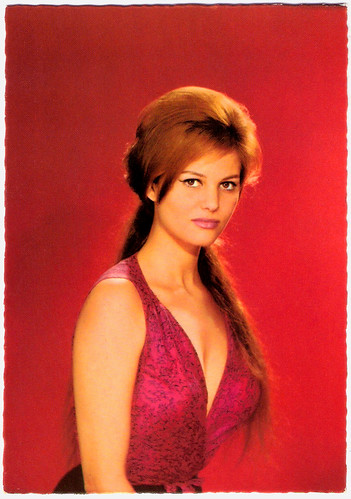
French postcard by E.D.U.G., no. 183. Photo: Sam Lévin.
Image may be NSFW.
Clik here to view.

French postcard by E.D.U.G., no. 230. Photo: Sam Lévin.
Image may be NSFW.
Clik here to view.

Big French card. Photo: Sam Lévin.
Image may be NSFW.
Clik here to view.
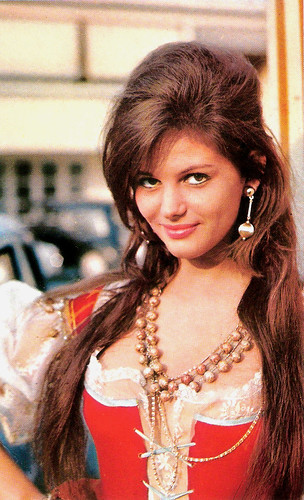
French postcard by Edition P.I., Paris, no. 1102. Photo: Kasparian. Publicity still for Cartouche (1962).
Pink Panther
In 1963 Claudia Cardinale played the princess who owned the Pink Panther diamond in The Pink Panther (Blake Edwards, 1963) which was filmed in Italy. It was the first in the series of detective comedies starring Peter Sellers as bumbling French Inspector Jacques Clouseau (the mishap-prone snoop was actually a supporting player in his debut).
The film was an enormous success and brought CC to English-speaking audiences. In 1964 she co-starred with John Wayne and Rita Hayworth in her first American production, Circus World (Henry Hathaway, 1964). It was another box-office hit.
The following year she appeared with Rock Hudson in Blindfold (Philip Dunne, 1966), an offbeat mixture of espionage and slapstick comedy.
The Professionals (Richard Brooks, 1966) is her favourite among her Hollywood films. In this Western, she is a gutsy Mexican woman married against her will to a rich American. The film received Academy Award nominations for Best Direction (Richard Brooks), Best Screenplay (Brooks again), and Best Cinematography (Conrad L. Hall).
Cardinale continued dividing her time between Hollywood and Europe for the remainder of the decade.
Image may be NSFW.
Clik here to view.
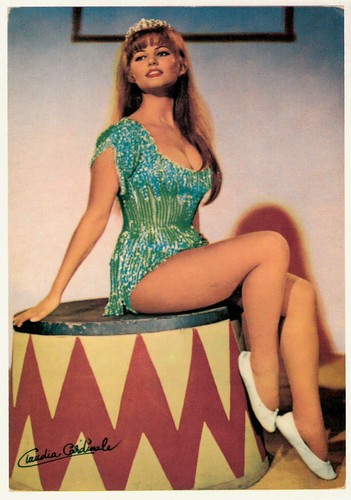
Postcard by Moviestar 1961, no. F 73. Photo: Publicity still for Circus World (1964).
Image may be NSFW.
Clik here to view.
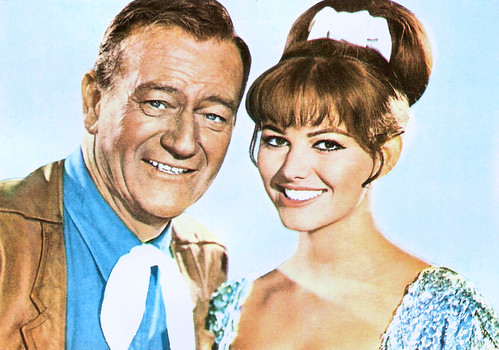
Romanian postcard by Casa Filmului Acin. Publicity still for Circus World (Henry Hathaway, 1964) with John Wayne.
Image may be NSFW.
Clik here to view.
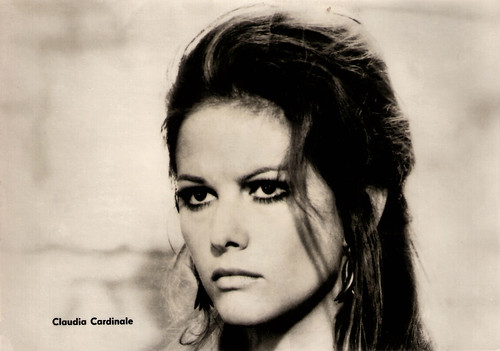
East-German postcard by VEB Progress Filmvertrieb, Berlin, no. 225/69, 1969. Photo: publicity still for Il giorno della civetta/The Day of the Owl (Damiano Damiani, 1968).
Image may be NSFW.
Clik here to view.
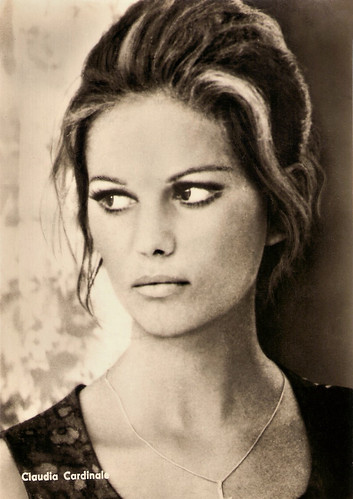
East-German postcard by VEB Progress Filmvertrieb, Berlin, no. 20/70, 1970. Photo: publicity still for Il giorno della civetta/The Day of the Owl (Damiano Damiani, 1968).
Image may be NSFW.
Clik here to view.
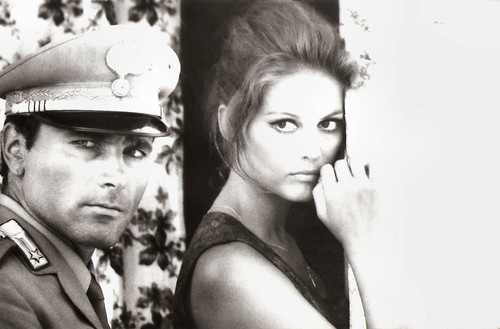
Romanian postcard by Casa Filmului Acin, no. 427. Photo: publicity still for Il giorno della civetta/The Day of the Owl (Damiano Damiani, 1968) with Franco Nero.
Image may be NSFW.
Clik here to view.
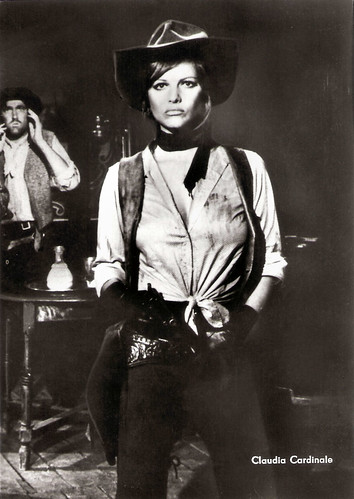
East-German postcard by VEB Progress Filmvertrieb, Berlin, no. 154/73. Publicity still for Les pétroleuses/Frenchie King (Christian-Jaque, 1971). The billing of BB vs. CC in this Western didn't live up to expectations.
The ultimate Spaghetti Western
Throughout the 1960s, Claudia Cardinale also appeared in some of the best European films. In France, she appeared in the Swashbuckler Cartouche (Philippe de Broca, 1962) featuring Jean-Paul Belmondo.
Back in Italy, she played in I Giorno della civetta/The Day of the Owl (Damiano Damiani, 1968) with Franco Nero, and Nell'anno del Signore/The Conspirators (Luigi Magni, 1969) with Nino Manfredi.
Mesmerizing is her performance in Sandra/Vaghe stelle dell'Orsa... (Luchino Visconti, 1965) as a Holocaust survivor with an incestuous relationship with her brother (Jean Sorel).
Another highlight in her career is C'era una volta il West/Once Upon a Time in the West (Sergio Leone, 1968), the ultimate Spaghetti Western. Lucia Bozzola writes in her review at AllMovie: "In Sergio Leone's epic Western, shot partly in Monument Valley, a revenge story becomes an epic contemplation of the Western past. (...)
As in his 'Dollars' trilogy, Leone transforms the standard Western plot through the visual impact of widescreen landscapes and the figures therein. At its full length, Once Upon a Time in the West is Leone's operatic masterwork, worthy of its legend-making title."
Image may be NSFW.
Clik here to view.

German collectors card by Bergmann-Verlag, Unna, in the series Show-Top-Stars.
Image may be NSFW.
Clik here to view.

German postcard by Krüger / Ufa. Sent by mail in the Netherlands in 1967. Photo: Fried Agency.
Image may be NSFW.
Clik here to view.

German postcard by ISV, no. H 126. Sent by mail in 1967.
Image may be NSFW.
Clik here to view.
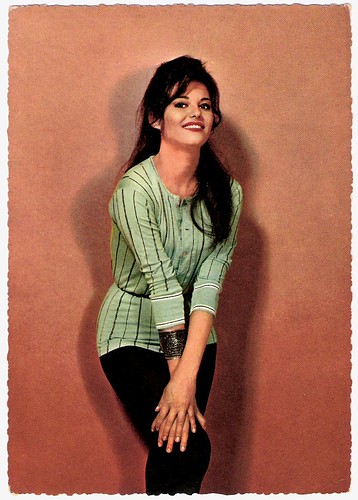
German postcard by Krüger, no. 902/47.
Image may be NSFW.
Clik here to view.
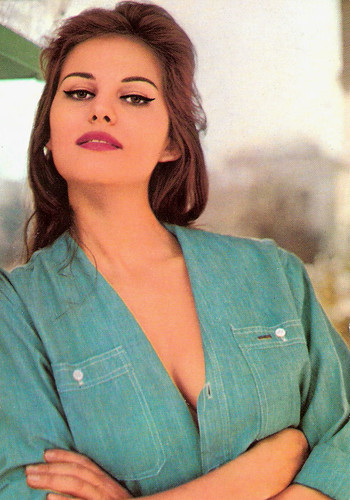
German postcard by Krüger, no. 902/115.
International arthouse hit
In the following decades, Claudia Cardinale remained mainly active in the European cinema. She played a small part for Visconti in Gruppo di famiglia in un interno/Conversation Piece (Luchino Visconti, 1974) starring Burt Lancaster and Silvana Mangano.
She worked with other major Italian directors at Goodbye e amen (Damiano Damiani, 1977), the TV mini-series Jesus of Nazareth (Franco Zeffirelli, 1977) as the adulteress, and La Pelle/The Skin (Liliana Cavani, 1981) starring Marcello Mastroianni and based on the bitter novel by Curzio Malaparte concerning the Allied liberation of Naples.
An international arthouse hit was Fitzcarraldo (Werner Herzog, 1982), the story of an obsessed impresario (Klaus Kinski) whose foremost desire in life is to bring both Enrico Caruso and an opera house to the deepest jungles of South America. In his diary of the making of Fitzcarraldo, Werner Herzog writes: "Claudia Cardinale is great help because she is such a good sport, a real trouper, and has a special radiance before the camera. In her presence, [Klaus Kinski] usually acts like a gentleman."
Other interesting films include the Luigi Pirandello adaptation Enrico IV/Henry IV (Marco Bellocchio, 1984) with Marcello Mastroianni, the epic La révolution française/The French Revolution (Robert Enrico, Richard T. Heffron, 1989), the nostalgic drama Mayrig/Mother (Henri Verneuil, 1991), and the romantic thriller And now... Ladies and Gentlemen (Claude Lelouch, 2002) starring Jeremy Irons.
On Television, she gave another well-received performance in the TV drama La storia/History (Luigi Comencini, 1986), in which she plays a widow raising a son during World War II.
Image may be NSFW.
Clik here to view.

French postcard by E.D.U.G., no. 229. Photo: Sam Lévin.
Image may be NSFW.
Clik here to view.

French postcard by E.D.U.G., no. 316. Photo: Sam Lévin.
Image may be NSFW.
Clik here to view.
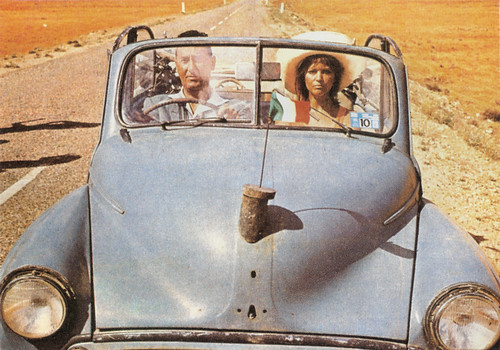
Italian postcard by Gruppo Editoriale Lo Vecchio, Genova in the Alberto Sordi series. Photo: publicity still for Bello, onesto, emigrato Australia sposerebbe compaesana illibata/A Girl in Australia (Luigi Zampa, 1971) with Alberto Sordi.
Image may be NSFW.
Clik here to view.
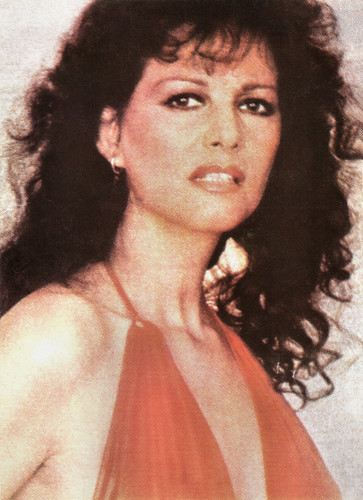
Romanian postcard by Casa Filmului Acin.
Image may be NSFW.
Clik here to view.

Romanian postcard by Casa Filmului Acin.
Strong political convictions
Claudia Cardinale is a liberal with strong political convictions. She is involved in many humanitarian causes, and pro-women and pro-gay issues, and she has frequently stated her pride in her Tunisian and Arab roots - as evidenced by her appearance as herself in the Tunisian film Un été à La Goulette/A Summer at La Goulette (Férid Boughedir, 1996).
She has managed to combine her acting work with the role of goodwill ambassador for UNICEF and advocate for the work of Luchino Visconti with whom she made four films.
She wrote an autobiography, Moi Claudia, Toi Claudia (Me Claudia, You Claudia). In 2005, she also published a French-language book, Mes Etoiles (My Stars), about her personal and professional relationships with many of her directors and co-stars through her over 50 years in show business.
In 2002, she won an honorary Golden Bear award of the Berlin Film Festival, and previously in 1993, she was awarded an honorary Golden Lion at the Venice Film Festival.
Cardinale works steadily on and in more recent years she has also worked in the theatre. In the cinema she appeared in the French-Tunisian gay drama Le fil/The String (Mehdi Ben Attia, 2009), the Algerian drama Un balcon sur la mer/A View of Love (Nicole Garcia, 2010) in which she played the mother of Jean Dujardin, and the costume drama Effie Gray (Richard Laxton, 2014) with Dakota Fanning. Claudia Cardinale currently lives in Paris. She has made over 135 films since 1956 and continues to star in films and TV series.
Image may be NSFW.
Clik here to view.
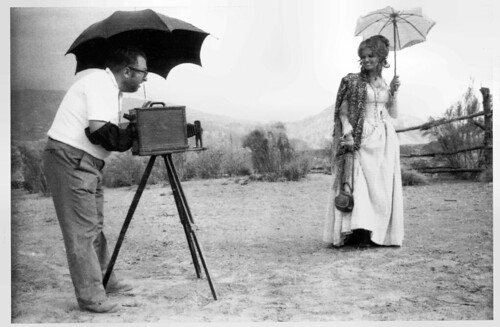
Italian postcard by Cineteca Bologna for the exhibition Un Altro West (2008). Photo: A. Novi. Sergio Leone and Claudia Cardinale at the set of C'era una volta il West/Once Upon a Time in the West (Sergio Leone, 1968).
Image may be NSFW.
Clik here to view.
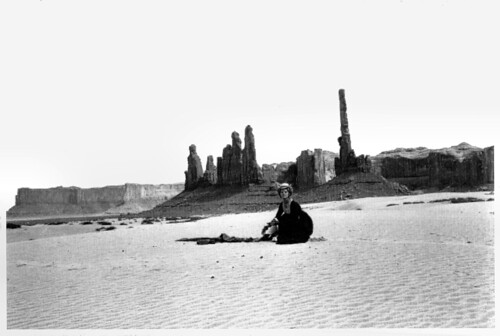
Italian postcard by Cineteca Bologna, 2007. Photo: A. Novi / Cineteca di Bologna. Claudia Cardinale in C'era una volta il West/Once Upon a Time in the West (Sergio Leone, 1968).
Image may be NSFW.
Clik here to view.

Italian postcard by Cineteca Bologna, 2007. Photo: A. Novi / Cineteca di Bologna. Claudia Cardinale in C'era una volta il West/Once Upon a Time in the West (Sergio Leone, 1968).
Image may be NSFW.
Clik here to view.

Romanian postcard by Casa Filmului Acin. Claudia Cardinale and daughter Claudia Squitieri.
Trailer for Fitzcarraldo (1982). Source: Film Society of Lincoln Center (YouTube).
Sources: Lucia Bozzola (AllMovie), Steve Rose (The Guardian), IMDb and Wikipedia.
This post was last updated on 2 September 2023.